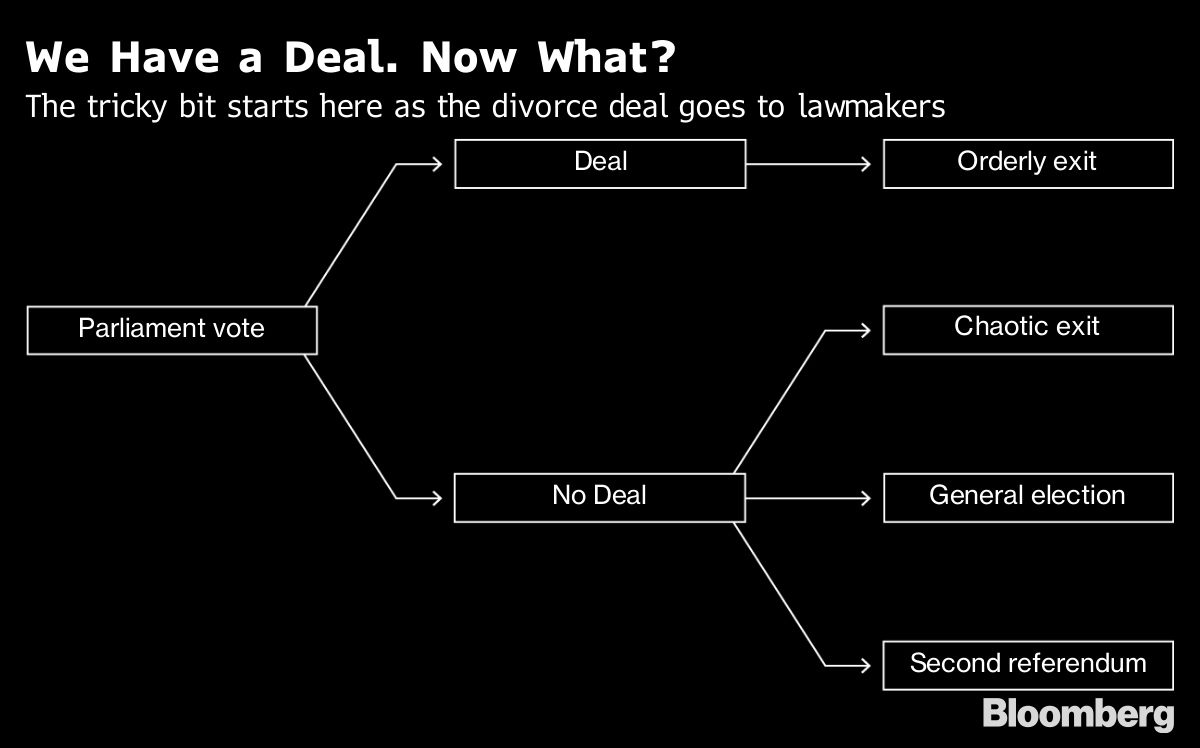Nov 25, 2018
EU backs Brexit divorce terms, warns U.K. won’t get better deal
, Bloomberg News

Theresa May staked her authority on a campaign to persuade Parliament against the odds to endorse her Brexit deal, as she refused to rule out quitting as U.K. prime minister if she fails.
After agreeing the U.K.’s divorce terms at a special summit in Brussels, European leaders warned British politicians they will not get a better deal if they reject the offer on the table because there is no "plan B."
May backed that view and announced she will personally lead a "campaign" lasting "a few weeks" to win support for her agreement among politicians and voters. Then, Parliament will hold a decisive vote on whether to accept or reject the accord before Christmas.
"I’ll take this deal back to the House of Commons confident we’ve achieved the best deal available and full of optimism about the future of our country," May said at a news conference in Brussels. "In Parliament and beyond it I’ll make the case for it with all my heart and I look forward to that campaign."
Asked if she would resign if Parliament refused to back her plan, May twice declined to give a direct answer. She said she’s focused on winning, and said the issue is about delivering Brexit not her own future.
May knows she is facing huge opposition from critics within her own Conservative Party. Even government ministers admit they have work to do to avoid defeat.
If she does lose, the U.K. will be on course to exit the EU in March with no agreement and no transition period to cushion the blow. Some politicians want to send her back to Brussels to renegotiate if her first attempt is voted down. But EU leaders had a coordinated message on Sunday: This is the only deal on offer.

"If there was anything better I can tell you Theresa May would have gotten that," Dutch Prime Minister Mark Rutte told reporters. "She has fought very hard, she was very stubborn, and she always is, in a positive sense, very tenacious."
European Commission President Jean-Claude Juncker said anyone hoping for fresh negotiations would be disappointed within "seconds" if Parliament rejects the deal, while Austrian Chancellor Sebastian Kurz added: "This is a take-it-or-leave-it situation."
Euroskeptics in May’s Conservative Party hate the withdrawal agreement and are vowing to oppose it because it forces the U.K. to keep close to the EU’s trade rules. Many pro-EU politicians in Britain also regard it as unacceptable because the U.K. will not have a say over the rules it must observe.
EU leaders including Chancellor Angela Merkel expressed sadness about the divorce, mourning the loss of a member state as the club of 28 nations shrinks to 27. May was asked if she shared those sentiments. "No," the prime minister replied. She added that she understood that some leaders were sad, and some people at home in Britain were, too.
--With assistance from Nikos Chrysoloras, Anna Hirtenstein, Gregory Viscusi and Ian Wishart.








